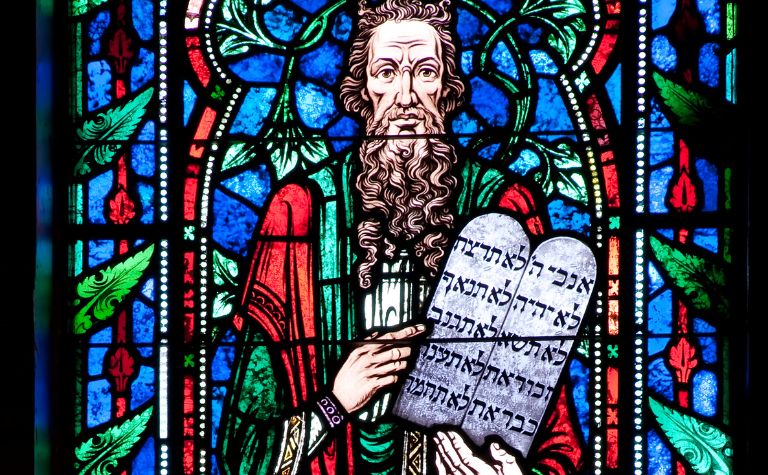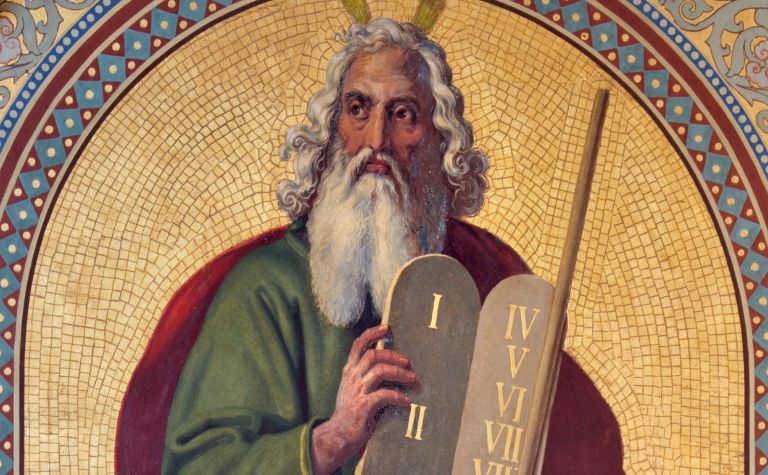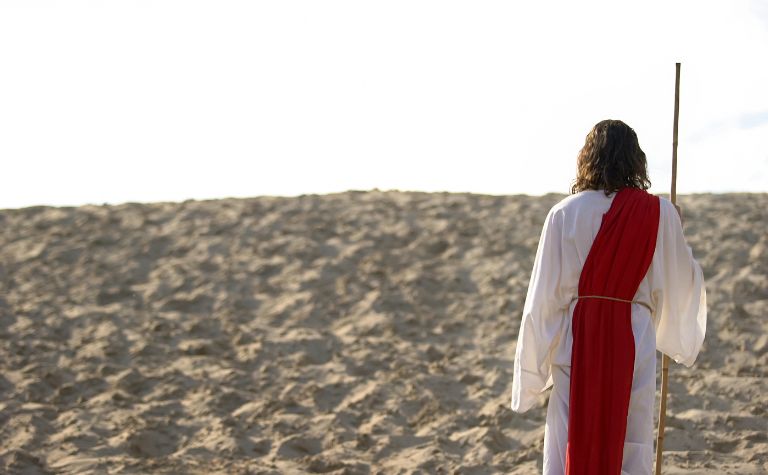Moses’ childhood was one of the most unique in the Bible. He was born to a Hebrew mother and father from the tribe of Levi, yet an Egyptian woman, Pharaoh’s daughter, raised him. Moses’ ancestry aligned him with one people group, yet he spent his formative years away from them in a foreign household. These unique circumstances make many Bible readers wonder what languages Moses spoke.
The Bible teaches that Moses spoke Hebrew, the language of the Israelites. Yet, most Jewish and Christian historians and theologians believe he also spoke Egyptian based on his upbringing and formal education in Egypt. However, the Bible never explicitly states that he did.
Did Pharaoh’s daughter adopt Moses? Did she consider him her son? What educational opportunities did she give him? In what ways was Moses formally educated as opposed to merely growing up in an Egyptian-speaking culture? Keep reading to learn the answers to these questions and others.
Also, the book of Exodus makes clear that Moses was Hebrew even though he grew up in the courts of Egypt. This fact makes many readers wonder what tribe Moses was from in Israel.

Why Scholars Believe Moses Spoke Egyptian
Moses is the author of the first five books of the Bible and the main character in four of them: Exodus, Leviticus, Numbers, and Deuteronomy. Exodus briefly narrates his early life and includes little information about his childhood and upbringing in Egypt (cf. Exod. 2:1-10).
The primary storyline of Moses’ life and ministry in the Old Testament starts when he is 40 years old (Exod. 2:11; Acts 7:23). In the Bible, only the book of Acts in the New Testament mentions Moses’ education. In the passage, Stephen, a recent convert to Jesus Christ, preaches to hostile Jewish authorities.
In his speech, he provides an overview of Old Testament history, much of which is about Moses (Acts 7:2-44), to persuade them that Jesus is the promised Messiah of the Jewish people.
In his biographical sketch, Stephen refers to Moses’ upbringing and education, including details Exodus doesn’t mention. The implications of what Stephen said strongly suggest that Moses spoke Egyptian in addition to Hebrew.
Pharaoh’s daughter adopts Moses
When Stephen referred to Moses’ childhood, he said, “Pharaoh’s daughter adopted him and brought him up as her own son” (Acts 7:21b).
Even though Moses’ mother, Joechebed, nursed him, he was likely two or three years old when she gave him permanently to Pharaoh’s daughter to raise him, an arrangement made a few years earlier to save his life as an infant (Exod. 2:1-10).
Therefore, Moses wasn’t merely a visitor in the Egyptian courts; he grew up there. Even though he was Hebrew, his childhood home was among the Egyptians.
Pharaoh’s daughter undoubtedly spoke Egyptian, exposing Moses to the language at an early age. As a result, he may have spent 40 years fully immersed in Egyptian culture, surrounded by the nation’s language.
Moses may have stayed in touch with his biological family
It was likely that Jochebed had limited visitation rights, or Moses had the freedom to stay in contact with his biological family because it’s clear from other passages that he had a relationship with his brother and sister, Aaron and Miriam.
Retaining a relationship with his family meant he was near the Hebrew language and culture. In addition, the books of the Bible he wrote, Genesis to Deuteronomy and Psalm 90, are in Hebrew, demonstrating that he spoke the language and knew it well enough to write in it.
Also, names have great importance in the Bible. Discover what Moses’ name means and how it relates to his life and legacy.

Moses Received An Egyptian Education
Next, after Stephen says that Pharaoh’s daughter adopted Moses and raised him as her son, he says, “And Moses was instructed in all the wisdom of the Egyptians, and he was mighty in his words and deeds” (Acts 7:22, ESV). This verse to Moses’ education and the results of it in his life.
Pharaoh’s daughter enabled Moses to get an education, and because she was a princess, it was likely Egypt’s best training. Yet, Moses’ education was no ordinary one. In the ancient world, the nation was a prominent place of learning. It also differed from the one he would have received among the Hebrews.
Egyptians instructed Moses
The Greek word describing Moses’ learning comes from the word paideuo. According to Thayer’s Greek Lexicon, the word means “to be instructed” or “to cause one to learn.” [1] Most English translations render the word as “instructed” (e.g., ESV), “educated” (e.g., NIV, NASB), or “learned” (e.g., KJV, NKJV).
Paul uses the same word to describe his formal and scholarly training under the famous Jewish rabbi Gamaliel. He says, “I am a Jew, born in Tarsus in Cilicia, but brought up in this city, educated at the feet of Gamaliel according to the strict manner of the law of our fathers, being zealous for God as all of you are this day” (Acts 22:3, emphasis added).
Moses learned the wisdom of Egypt
The “wisdom of Egypt” likely included learning about their spiritual beliefs, history, literature, and more. Moses probably knew about the Egyptian gods he battled in the story of the Ten Plagues.
Confronting the Pharaoh may not have been his first encounter with his adopted grandfather. He may have known about the army that chased him and the Israelites to the edge of the Red Sea.
In the ancient world, a people group considered its language superior to others and often divine. It’s doubtful that the best instructors in Egypt would have translated all they taught Moses into Hebrew in preparation to teach him about their sacred culture and values. These facts suggest that Moses spoke Egyptian and likely knew it well.
Was Moses a good speaker or not?
Stephen ends his description of Moses’ childhood and education by saying Moses “was mighty in his words and deeds” (Acts 7:22). How was Moses mighty with words? And how does this description align with what Moses said to God about his inability to speak?
As Exodus records, Moses initially protested God’s call, saying, “Oh, my Lord, I am not eloquent, either in the past or since you have spoken to your servant, but I am slow of speech and of tongue” (Exod. 4:10, ESV). For some scholars, the answer to the question hints at the languages Moses spoke. Keep reading to find out how.
Also, Moses’ departure from Egypt is one of the most dramatic events of his life. Learn how old Moses was when he left Egypt to get more understanding.

Did Moses Complain to God About His Language Competency?
Some Bible scholars believe that when Moses told God he wasn’t a good speaker, he was searching for an excuse because he didn’t want to do what God asked.
For example, Acts commentator I. Howard Marshall writes that Moses’ complaints “were little more than a pretext for avoiding a task that he did not wish to undertake.” [2]
Yet others think that his protest relates to the languages he spoke. One argument is that Moses was telling God that he lost his ability to speak Egyptian because he had lived in Midian for 40 years.
However, others scholars replied that if Moses had lost any language, it would have been Hebrew because he was raised in Egypt under the supervision of the Pharaoh’s daughter. [3]
Even if Moses’ complaint to God about his speaking ability doesn’t refer to speaking Hebrew or Egyptian, many scholars believe there is sufficient evidence in Stephen’s speech to conclude that he spoke both.
References:
[1] Bible Hub
[2] Acts by I. Howard Marshall. Tyndale New Testament Commentary. p. 148.
[2] brill.com
Related Questions
Bible readers remember Moses for learning God's name through a burning bush, parting the Red Sea using God's power, and receiving the 10 Commandments from God on Mount Sinai. He is also known for...
According to the New Testament gospels of Matthew, Mark, and Luke, Moses is in heaven. In the story, commonly called the Transfiguration, Moses and the prophet Elijah appear to Jesus Christ. Matthew...
